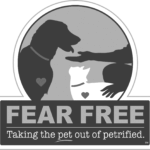Everyone Does It
February 21, 2012
Pet owners spend an inordinate amount of time viewing, cleaning up and thinking about their pets’ bowel movements. (This rule also, of course, applies to parents of young children, but that’s well beyond the scope of this blog.) Is my pet going enough? Too much? Does it have an unusual smell? Does it look funny? And, if you have a pet who likes to eat inappropriate items…hey, what’s that weird thing in my dog’s poop?
As the proud daughter of a gastroenterologist, bowel discussions were the norm in my childhood home. As a veterinarian, fecal discussions with clients now occupy a large portion of my days. Thanks to cell phone technology, I’m also frequently shown photos of bowel movements for analysis. A discussion of normal and abnormal poop behaviors is a worthwhile endeavor for any pet owner, so let’s let it fly!
Normals:
- 1-4 bowel movements per day, per pet (more for pediatric animals; more for dogs than cats, typically)
- Light to dark brown in consistency. Color changes are usually not a cause for concern, and are typically a reflection of something the animal ate. The exception to this would be bright red (or frank) blood, or black, tarry stools, which can indicate digested blood.
- A reasonably solid consistency, such that the bowel movement could be picked up from a carpet and not leave a mark
- Occurring on a reasonably predictable schedule (more for dogs than cats, typically 20-30 minutes after meals)
- Flatulence (gas). Some animals are more flatulent than others (Bulldogs and Boxers, I’m talking about you), but a certain amount of gas is normal for all animals.
Abnormals:
- Diarrhea, cha, cha, cha! This is a no-brainer, but warrants a bit of conversation. Diarrhea is exceedingly common in dogs and cats, and most is self-limiting (which means it will resolve without treatment within 2-3 days.) If the diarrhea has persisted for more than a few days, your pet isn’t eating, has vomiting in association with the diarrhea, has blood in the stool and/or just isn’t acting well, they should be seen by your vet.
- Blood in the stool. This can appear as bright red drops of blood on top of the bowel movement, or as dark, tarry stool (called melena), which indicates digested blood coming from higher in the GI tract. Either warrants a vet visit.
- Straining to defecate. If your pet has a bowel movement, then looks as if they are repeatedly attempting to produce more stool without success, this is called tenesmus. It is often associated with colitis (inflammation of the colon), but can be associated with other more serious problems.
- Scooting (e.g., dragging the anal area repeatedly across the floor). If persistent, this behavior can cause trauma to the anal area. Often scooting is caused by something simple, such as irritation in the anal sacs or itching from a skin condition.
- Spaghetti-like or rice-like objects in the stool. Roundworms, and other types of worms, can appear in the stool and may have a thin, noodle-like appearance. Tapeworm segments can look like grains of rice or sesame seeds. If these critters are noted in your pet’s stool, call your vet and we will likely recommend you bring in a fecal sample for analysis.
- Constipation; this is defined as straining to defecate, then producing small, hard stools. Obstipation is repeatedly straining to defecate, without being able to produce any stool due to impaction of hard fecal material. This is entirely more common in cats than dogs. Any animal straining to defecate without producing a stool should be examined immediately.
The bottom line is that bowel issues are very common in cats and dogs, and often result from minor conditions such as transient infections or “dietary indiscretion” (eating from the trash can, or stealing a stick of butter from the kitchen counter). No need to panic if the fecal matter looks or smells unusual; it will never smell like roses even if your dog eats a dozen. Please call your veterinarian to discuss any poop-related concerns; trust me, it’s one of our favorite topics!



